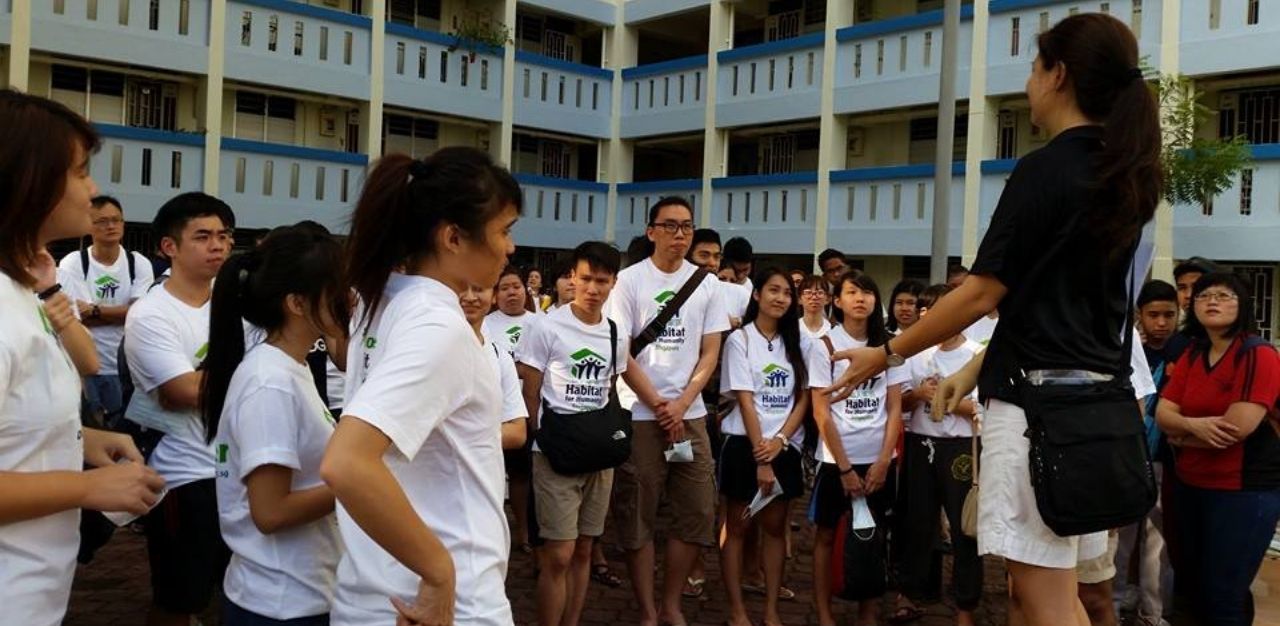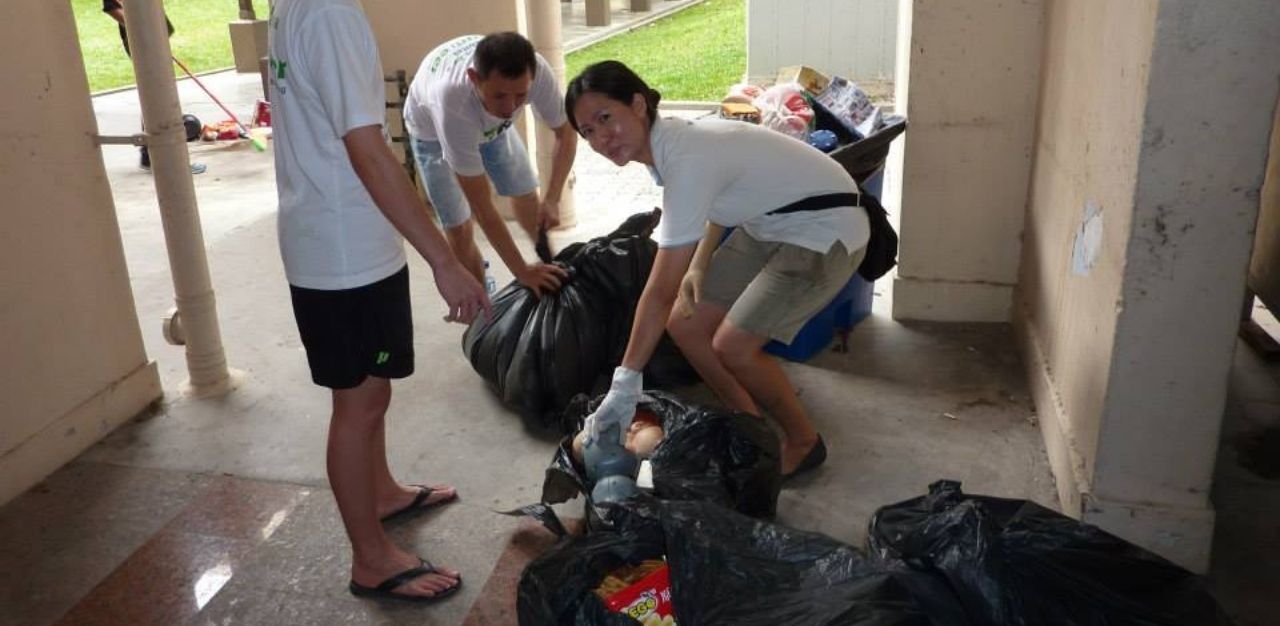Through our weekly series In Conversation With, TheHomeGround Asia amplifies and celebrates the ideas, achievements and experiences of extraordinary individuals who are creating ripples in unique ways. This week, we speak to Sim Chun Hui, senior manager at Habitat for Humanity, a Christian organisation that builds and cleans up houses for low-income households globally.
Born without a right forearm did not stop Sim Chun Hui from counting her blessings. But it hasn’t always been easy for the present-day senior manager of Habitat for Humanity, a US-originated Christian charity that provides decent housing to low-income families across the world.
“When I was as young as three, strangers would always come up to my parents and ask questions,” says Ms Sim. “Sometimes, they would even come up to me when I was alone with my sister. I always felt like a deer in the headlights.”
People usually assume that she was a victim of a motorbike accident, and these unwarranted conversations occur at any time and place — even when she is waiting for the traffic light to turn green.
For a long time, she adopted the “ostrich mentality”, even on her first date with her husband. The desire to prove to the world that she could do everything on her own despite her disability, coupled with her feelings of incompleteness, denial, and shame, eventually drove her to anxiety and she suffered from insomnia by her early 20s.
It wasn’t until she embraced her faith and found fulfilling work in an inclusive workplace environment that her life changed tremendously. Today, she believes that being vulnerable and open about her disability makes for deep conversations, especially for anyone out there who might be going through the same struggles.

TheHomeGround Asia dives into Ms Sim’s world and learns about her relationship with her artificial arm, how she confronted her disability, and eventually found meaningful work and love.
TheHomeGround Asia (THG): When did you first become acutely aware of your disability?
Sim Chun Hui (CH): Throughout my childhood, I always knew that I had it harder than the other kids. But I think the point in my life where I felt that life was very unfair was probably in Secondary 2. It was around the time when I was trying to figure out what I wanted to do with my life. I was interested in singing, but my immediate thoughts were, “why would anyone listen to a disabled singer?” That was when I realised that some things would never be possible for me because I am disabled.
THG: What was it like being born and growing up with a disability?
CH: I always felt ashamed of my disability; like I was created with a flaw. For many years, I was in denial. Whenever I looked in the mirror, I didn’t actually see my handicap. I pretended that it didn’t exist. I became depressed by the time I was in my early 20s. I had trouble sleeping and constantly felt anxious.
THG: What helped you cope?
CH: I was from Anglican High, a Christian secondary school, and we would sing hymns. Even though at the time I hadn’t yet believed in God, I still prayed because I had nothing else left to try. It was the only thing that could bring me peace to help me fall asleep.
THG: What is it like wearing your artificial arm?
CH: It’s nice because there are only some things I can do when my [artificial arm] is on. But there are times when I felt this literal weight on me, which was quite frustrating. For example, if I were to go swimming with my friends in a public pool, where do I put it? If I had to leave it out in the open, it might give somebody a shock!
Once during a school camp, there was an activity that involved us jumping into the water. At the time, I was still in denial, and only my close friends and family had seen me take off my arm. Since the entire cohort was there at the time, I just jumped into the water with the arm. It was buoyant and I had to keep pushing it under. I remember being worried about water damage.
THG: Do you still wear your artificial arm?
CH: My arm and I … we share a love-hate relationship. Nowadays, I usually wear it when I go out. Whenever strangers ask me about it, I sometimes don’t know how to answer still. But it is definitely better than in the past when I was still bitter and would make snarky remarks, telling them to mind their own business.
One day it struck me that maybe they were asking because they have a loved one who is going through something similar. That’s when I started taking a different approach when dealing with such questions. There were times that when I shared, people opened up about their own lives. I realised that whenever I allow my weaknesses to show, it actually makes for deep conversations.
THG: Did you experience any unique difficulties in the romance department?
CH: During my first date with my then-boyfriend-now-husband, I pretended nothing was amiss, hoping he wouldn’t notice my disability and think I was perfect. So, on our first date, we went to the Science Centre and there was this thermal scanner exhibit. I didn’t think that if I were to walk through the scanner, my artificial arm would not light up on the screen. That was how he found out. He thought maybe I wasn’t ready to talk about it, so he didn’t ask me.
When things got serious, I decided one day that I would not put on my artificial arm. That day, when he came over and sat down, he held my right arm and cried. He told me he felt the pain that I went through. I will never forget that.
THG: Have you ever experienced any prejudices as a disabled person?
CH: There were instances when I felt I was being “cancelled”, such as during my first interview for an internship when I was in polytechnic. The role was for an events company and it required quite a bit of physical work. Once the employer realised that I had a handicap, she said, “I don’t think you can do the job”. To make matters worse, she started to psychoanalyse me and wanted me to explain why I applied for a job “that I knew I couldn’t do” and it really affected me. The sense of hopelessness she gave me rose to the surface whenever I applied for a job after I graduated.
Looking back, I guess I’m just hoping for people to give me a fair assessment instead of assuming my capabilities based on my disability. Like, “okay, she has a disability, but she also has these other strengths”, rather than focusing solely on what I can’t do.
THG: Looking back, what strengths did your disability give you?
CH: Having just one arm, even for the simplest of things like drawing a line, I would have to figure out how to hold the ruler while I draw the line. I had to anticipate more than the average person, and I have become a very organised person because of it. Over the years, I found out that my strength is in organising messy situations, which is perhaps why my present-day job suits me well.
THG: How did you end up with Habitat for Humanity (HFH)?
CH: This happened in 2011, the same time as when I became a Christian. Then, I was praying to God to show me direction — in my life and in my career. After praying for months, I received a strong and clear message that I should give back to society. It was like a moment of absolute clarity.
I started looking around and whenever I volunteered, it was always at an HFH event, so I continued with them for a year. In December 2012, I wrote an email to the National Director, saying that I really wanted to work with HFH. He told me then that a vacancy just became open. It was like divine intervention.
THG: Do you face any physical challenges at work then?
CH: There is sometimes a lot of physical labour at HFH, including cleaning and decluttering the beneficiaries’ homes. The homeowners would often notice that I have a disability, and I think they see a bit of themselves in me. Some of them may have health issues such as stroke, which prevents them from cleaning up their own homes. I think I have given them hope, which they could have lost along the way.
My colleagues, managers, and employers are all very supportive. They’re willing to get creative or even do more in some areas, such as drive me around because I don’t have a license. I’m really thankful for the culture at Habitat for Humanity (HFH). I think if you were to ask my boss now, he would say that he never saw me as a disabled employee.

Check out housing charity Habitat for Humanity’s projects here.
Join the conversations on TheHomeGround Asia’s Facebook and Instagram, and get the latest updates via Telegram.














